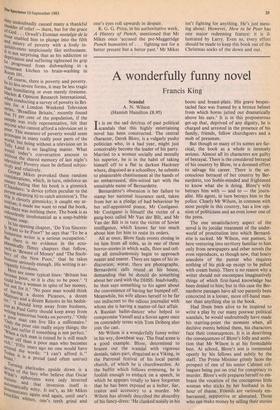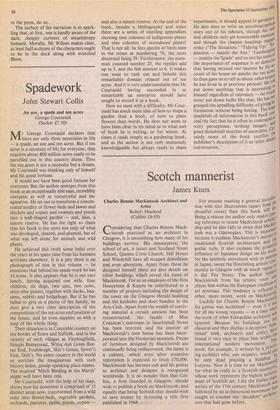A wonderfully funny novel
Francis King
Scandal A. N. Wilson (Hamish Hamilton 03.95) t is on the sad detritus of past political scandals that this highly entertaining novel has been constructed. The central dharacter, Derek Blore, is a vulgarly pushy politician who, in a bad year, might just conceivably become the leader of his party. Married to a woman socially and morally his superior, he is in the habit of taking himself off to a flat in darkest Hackney where, disguised as a schoolboy, he submits to pleasurable chastisement at the hands of an embarrassed, dim-witted tart with the unsuitable name of Bernardette.
Bernardette's obsession is her failure to stamp her national insurance card, taken from her as a pledge of bad behaviour by her self-appointed ponce, Mr Costigano. Mr Costigano is himself the victim of a gang-boss called Mr Van der Bill, and Mr Van der Bilt is in turn the victim of Soviet intelligence, which knows far too much about him for him to resist its orders.
All at once, Blore finds events closing in on him from all sides, as in one of those horror-stories in which walls, floor and ceil- ing all simultaneously begin to approach nearer and nearer. There are tapes of his in- discretion; worse, there are photographs. Bernardette calls round at his house, demanding that he should do something about her card with the DHSS. Inadvisedly, he then says something to his agent about the convenience of having her bumped off. Meanwhile, his wife allows herself to be far too indiscreet to the odious journalist with whom she is having a matter-of-fact affair. A Russian ballet-dancer who helped to compromise Vassall and a Soviet agent once on comradely terms with Tom Driberg also join the cast.
Mr Wilson is a wonderfully funny writer in his wry, downbeat way. The final scene is a good example. Blore, determined to brazen out the scandal with vigorous denials, takes part, disguised as a Viking, in the Patronal festival of his local parish church, of which he is churchwarden. At the buffet which follows evensong, he is foolish enough to embark on a speech, in which he appears totally to have forgotten that he has been exposed as a lecher, liar, traitor and accessory to a murder. Mr Wilson has already described the absurdity of his fancy-dress: 'He clanked noisily in his boots and breast-plate. His grave bespec- tacled face was framed by a bronze helmet from which horns jutted out dramatically above his ears.' It is in this preposterous get-up that, deprived of any dignity, he is charged and arrested in the presence of his family, friends, fellow churchgoers and a mob of pressmen.
But though so many of its scenes are far- cical, the book as a whole is intensely serious. Almost all its characters are guilty of betrayal. There is the considered betrayal of his country by Blore, in a doomed effort to salvage his career. There is the un- conscious betrayal of her country by Ber- nardette, too feeble-minded and frightened to know what she is doing. Blore's wife betrays him with — and to — the journ- alist. His agent, in turn betrays him to the police. Clearly Mr Wilson, in common with most people in this country, has a low opi- nion of politicians and an even lower one of the press.
The one unsatisfactory aspect of the novel is its jocular treatment of the under- world of prostitution into which Bernard- ette is sucked. Mr Wilson, one guesses, is here venturing into territory familiar to him only from newspapers and other novels (he even reproduces, as though new, that hoary anecdote of the punter who requires nothing of his pick-up except to be pelted with cream buns). There is no reason why a writer should not encompass imaginatively things of which first-hand knowledge has been denied to him; but in this case the Ber- nardette passages have all too patently been concocted in a looser, more off-hand man- ner than anything else in the book.
Had Ibsen been alive to be inspired to write a play by our many postwar political scandals, he would undoubtedly have made his starting-point the moment when, all decisive events behind them, his characters face their conseuctences. It is in describing the consequences of Blore's folly and ambi- tion that Mr Wilson is at his formidable best. At school, Blore's son is tormented openly by his fellows and subtly by the staff. The Prime Minister grimly faces the prospect of one of his senior Cabinet col- leagues being put on trial for conspiracy to murder. Blore's wife prepares herself to em- brace the vocation of the courageous little woman who sticks by her husband in his hour of shame. Friends are variously em- barrassed, supportive or alienated. Those who can make money by selling their stories to the press, do so.
The surface of the narration is so spark- ling that, at first, one is hardly aware of the dark, choppy currents of misanthropy beneath. Morally, Mr Wilson makes clear, at least half-a-dozen of the characters ought to be in the dock along with wretched Blore.







































 Previous page
Previous page